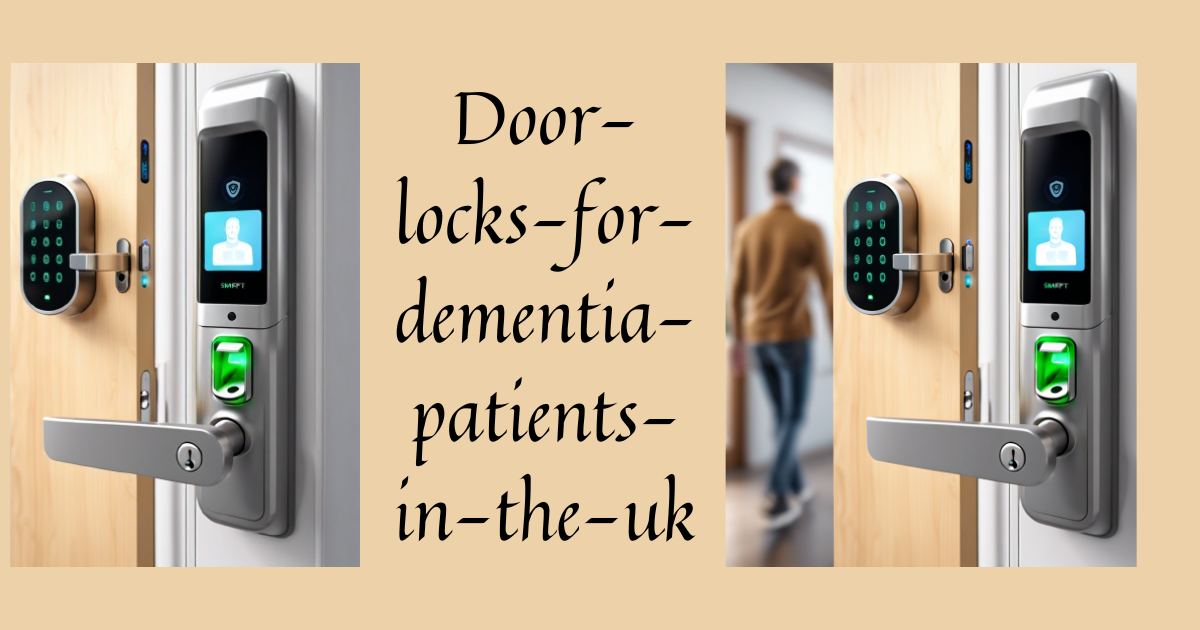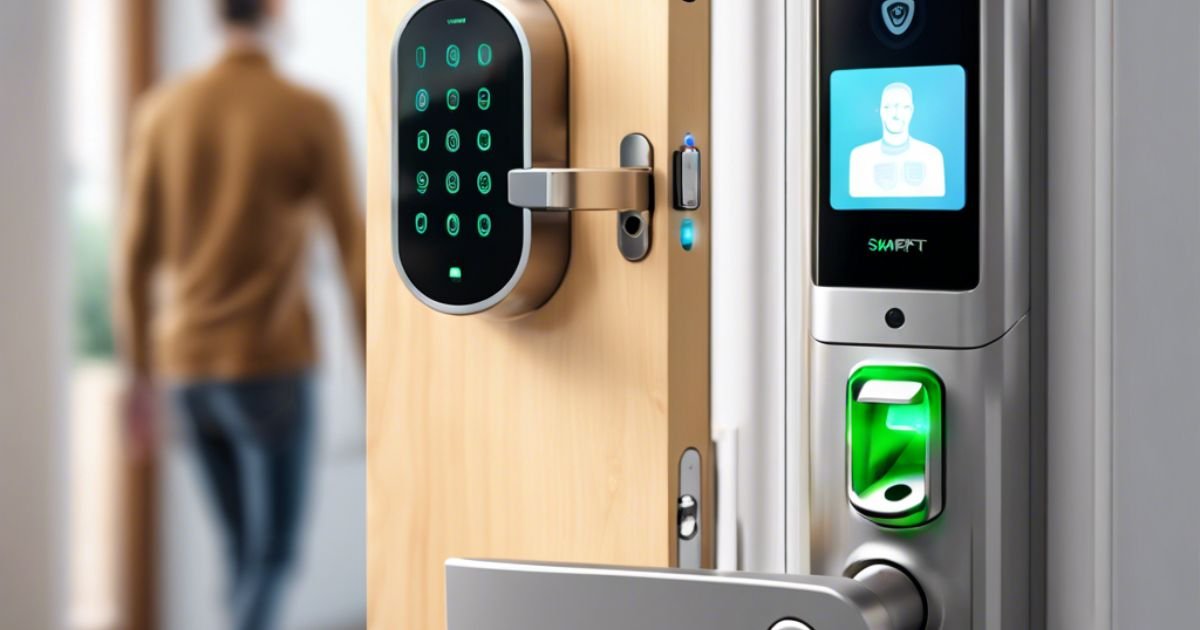Caring for someone with dementia presents unique challenges, particularly when it comes to ensuring their safety at home. Dementia patients are at a higher risk of wandering, which can lead to dangerous situations if they manage to leave their home unsupervised. One effective solution to mitigate this risk is the use of specialized door locks. In this article, we’ll explore the various types of door locks available in the UK that are designed to enhance the safety and independence of dementia patients.
Challenges Faced by Dementia Patients
Wandering and Its Risks
Wandering is a common behavior among dementia patients. It occurs due to confusion, memory loss, or the simple urge to move around. Unfortunately, this behavior can lead to serious consequences, such as getting lost, exposure to environmental hazards, or injury. Preventing unsupervised wandering is crucial to maintaining the safety of dementia patients.
Cognitive Decline and Memory Loss
As dementia progresses, cognitive functions such as memory, judgment, and problem-solving deteriorate. This decline makes it difficult for patients to recognize familiar places or remember how to get back home. Therefore, having secure door locks that they cannot easily bypass becomes essential in preventing them from wandering off.
Need for a Secure Living Environment
Creating a secure environment is not just about physical safety; it’s also about providing peace of mind for both the patient and their caregivers. A well-secured home reduces the risk of accidents and allows patients to maintain a level of independence without compromising their safety.
Types of Door Locks Suitable for Dementia Patients
Keypad Locks
How They Work
Keypad locks require a numerical code to unlock the door. They can be easily programmed with a code that only caregivers know, ensuring that dementia patients cannot open the door without assistance.
Benefits for Dementia Patients
These locks are ideal for dementia patients because they do not require a physical key, which can be easily lost or forgotten. The simplicity of entering a code makes it accessible for caregivers while still providing a high level of security.
Smart Locks
Remote Monitoring and Control
Smart locks are one of the most advanced options available. They allow caregivers to lock or unlock doors remotely using a smartphone app. This feature is particularly useful for monitoring the patient’s movements and ensuring they are safe at all times.
Integration with Other Smart Devices
Smart locks can be integrated with other smart home devices, such as security cameras or alarms. This creates a comprehensive security system that can alert caregivers if the patient attempts to leave the house, adding an extra layer of protection.
Biometric Locks
Fingerprint Recognition
Biometric locks use fingerprint recognition to unlock doors. This technology ensures that only authorized individuals can access the home, making it nearly impossible for dementia patients to wander off without supervision.
Advantages of Biometric Security
Biometric locks are highly secure and eliminate the need for keys or codes, which can be forgotten. They also offer quick and easy access for caregivers, streamlining their daily routines.
Anti-Wandering Door Alarms
How They Enhance Safety
Anti-wandering door alarms are designed to alert caregivers if a dementia patient tries to leave the house. These alarms can be installed on doors and windows, providing an immediate warning if the patient attempts to wander.
Combining Alarms with Lock Systems
These alarms work best when combined with other locking systems. For example, pairing an anti-wandering alarm with a smart lock can give caregivers both the alert and the ability to remotely lock the door, preventing the patient from leaving.
Traditional Locks with Additional Safety Features
Modifications for Dementia Care
Traditional locks can be modified with additional safety features, such as childproof covers or locking mechanisms that are difficult for dementia patients to operate. These modifications are a cost-effective way to enhance security without investing in more advanced technology.
Cost-Effectiveness and Accessibility
While advanced locks like smart or biometric systems can be expensive, traditional locks with added safety features are more affordable and accessible for many families. They still provide the necessary security to protect dementia patients.
Legal and Ethical Considerations
Balancing Safety and Autonomy
One of the biggest challenges in caring for dementia patients is balancing their safety with their autonomy. Caregivers must ensure that the patient is safe without making them feel imprisoned or restricted in their own home. This requires careful consideration of the type of lock used and how it is implemented.
Legal Requirements for Caregivers in the UK
In the UK, caregivers have legal responsibilities to ensure the safety of dementia patients. This includes making the home environment secure and preventing the patient from wandering into potentially dangerous situations. Caregivers should be aware of the legal implications of their choices when selecting door locks.
Choosing the Right Lock: Factors to Consider
Assessing the Individual Needs of the Patient
Every dementia patient is different, and their needs will vary depending on the severity of their condition. When choosing a door lock, caregivers should consider the patient’s cognitive abilities, mobility, and the layout of the home.
Budget and Installation Considerations
Budget is an important factor when selecting a door lock. While advanced systems like smart or biometric locks offer great security, they can be expensive to purchase and install. Caregivers should weigh the benefits against the cost to determine the best option for their situation.
Ease of Use and Accessibility for Caregivers
It’s important that the chosen lock is easy for caregivers to use. Complicated systems can add unnecessary stress to daily routines, so opting for a lock that is both secure and user-friendly is essential.
Top Door Lock Brands and Products in the UK
Yale Smart Locks
Yale is a trusted brand known for its high-quality smart locks. These locks offer features like remote access, integration with smart home systems, and customizable codes, making them an excellent choice for dementia care.
August Smart Lock Pro
The August Smart Lock Pro is another popular option in the UK. It’s known for its ease of use and compatibility with a wide range of smart home devices. Caregivers can monitor and control the lock from anywhere, providing peace of mind.
Schlage Connect
Schlage Connect is a robust smart lock that offers both keyless entry and advanced security features. It’s a durable and reliable choice for homes with dementia patients.
Tunstall Door Sensors
Tunstall offers specialized door sensors that are particularly useful for dementia care. These sensors can alert caregivers if a door is opened, helping to prevent wandering and ensuring the patient’s safety.
DIY Installation vs. Professional Help
When to Consider Professional Installation
While some locks are easy to install on your own, others may require professional installation, especially if they involve complex systems like smart or biometric locks. Professional installation ensures that the lock is properly fitted and functions correctly.
DIY Tips for Caregivers
For those who prefer a DIY approach, there are plenty of resources available to guide you through the installation process. Simple modifications or traditional locks can often be installed without professional help, saving time and money.
Real-Life Success Stories and Testimonials
Case Study 1: Enhancing Safety with Smart Locks
One family in the UK used a smart lock system to keep their loved one with dementia safe. The system allowed them to monitor the patient’s movements remotely and receive alerts if any doors were opened. This technology gave them peace of mind and significantly reduced the risk of wandering.
Case Study 2: Balancing Security and Independence
Another case involved a family that used a combination of traditional locks and door alarms to secure their home. They found that this approach provided enough security to prevent wandering while still allowing the patient some independence in moving around the house.
Conclusion of Door Locks for Dementia Patients
Securing the home environment for dementia patients is a critical part of their care. With the right door lock, caregivers can prevent wandering, enhance safety, and provide peace of mind. Whether you choose a smart lock, a biometric system, or a modified traditional lock, the most important factor is ensuring that the chosen system meets the needs of the patient and their caregivers. By carefully considering the options and weighing the benefits, you can create a safe and supportive environment for your loved one.
FAQs OF Door Locks for Dementia Patients
What is the best type of lock for a dementia patient?
The best type of lock depends on the individual needs of the dementia patient. Smart locks and biometric locks are popular for their security features, while traditional locks with additional safety features can be a cost-effective option.
Are smart locks safe for older people dementia patients?
Yes, smart locks are safe for older peopledementia patients. They offer features like remote monitoring and control, which allow caregivers to ensure that the patient is safe even when they are not at home.
Can door alarms prevent wandering in dementia patients?
Door alarms are an effective way to prevent wandering in dementia patients. They provide an immediate alert if the patient attempts to leave the house, giving caregivers time to intervene.
How do I choose the right lock for my loved one with dementia?
To choose the right lock, consider the patient’s cognitive abilities, the level of security needed, and your budget. It’s also important to think about ease of use for caregivers.
Is professional installation necessary for these locks?
Professional installation may be necessary for more complex systems like smart or biometric locks. However, simpler modifications to traditional locks can often be done by caregivers themselves.

